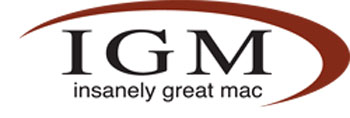Opinion: iPod, Now iTunes: Is Apple Becoming a Windows Developer by Stealth?
May 10th 2003
Just how much of a Windows developer is Apple becoming? And how far should it go?
While the iPod ships with MusicMatch Jukebox, that won't be the case by the end of '03. iTunes for Windows is coming and coming fast, in order to soak that enormous Wintel market at 99¢ per one-click.
QuickTime is another release for the Dark Side, although that makes sense, given it competes with Real and WMP - although I've never seen a Pro version of QuickTime on any Windows PC. AppleWorks, too, is available in a Windows edition, as was ClarisWorks, although this version is strictly for Education. You're highly unlike to find a retail version on the shelves of your local Apple Retail Store.
Which brings us the question: should Apple develop more software for Windows?
An iTunes for Windows means that Apple is not attempting to attract 'switchers'; it's merely trying to extract as much cash from the other 97% as cheaply and as painlessly as possible.
Filemaker Pro. Now there's an innovative little company, at arm's length from Apple, presumably, that has a reputation with the Windows business market that even CEO Jobs must envy. Filemaker even does downloadable data for cell phones now. Yes, Filemaker gets Respect. It's the sole piece of almost-Apple-software you can find on a megastore's shelves.
iPod for Windows. Yes, it's hardware and it's not a Mac, but no self-respecting, music-loving, Wintel-owning dude would be without one (assuming they can meet the price of the entry ticket). It took no time for iPod: Win users to take more than 50% of the 'Pod market. Is there a lesson there?
Instead of going the much-hyped, little-evidenced 'X-on-x86' route, would a Windows software strategy help Apple? Would it make sense to sell into the Wintel market? There could be two ways to look at this: first, to generate revenue from the Windows market; or, alternatively, to encourage Windows user to switch.
Now Phil Schiller has said previously that Final Cut Pro (FCP) is its own little "eco-system", with users developing their own niche around the Mac and FCP. Good. Great, in fact. It's the de facto standard for portable video. And Adobe ain't happy.
All right. Let's make Adobe even more unhappy: release FCP for Windows. And DVD Studio Pro. At $999 a pop, and precious little overhead, profit-per-unit would exceed basic eMacs and iBooks by probably 60%-plus.
And what would Adobe do? Cancel Photoshop for Mac? Sure. Mac software makes up 40% of their revenue. Sometimes more. Apple sneezes and Adobe gets a cold. Like during the transition to OS X.
Then there's Shake and the Emagic stuff Apple has cancelled on the Windows platform. Plus some Astarte software that's probably still lying around.
No, this isn't a sell-out to the enemy. It's just being pragmatic about the revenue base. Not everyone's a potential switcher.
Of course, Apple could still screw this up. After all, it's made a mess of PowerSchool. However, that might simply have been the result of putting Cheryl Vedoe in charge (who couldn't organize a look out the window).
The bottom line is that there's serious money to be made in the Windows software market, and Apple hasn't yet tapped into it. Microsoft has known for decades that there's good profits to be made on both sides of the fence. So long as you own both sides of the fence. But that doesn't mean that Apple can't compete. With its free consumer software (iMovie, iTunes), it's drawn admiration and converts to Mac. In DV, it's killed Adobe's Premiere in the Mac market space, and blown a big hole through it on the Wintel side.
iPod. iTunes. For Windows. If you ask me, the Wintelians are just ripe for the picking...
